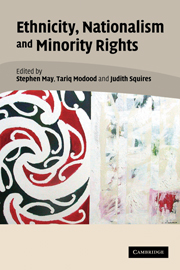Book contents
- Frontmatter
- Contents
- Preface
- List of contributors
- 1 Ethnicity, nationalism, and minority rights: charting the disciplinary debates
- Part I Ethnicity and ethnic groups
- 2 Ethnicities and multiculturalisms: politics of boundaries
- 3 Ethnicity without groups
- 4 Ethnicity, class, and the 1999 Mauritian riots
- 5 Black nationalism and African American ethnicity: the case of Afrocentrism as civil religion
- Part II The state and minority claims
- Part III New directions
- Index
- References
4 - Ethnicity, class, and the 1999 Mauritian riots
Published online by Cambridge University Press: 22 September 2009
- Frontmatter
- Contents
- Preface
- List of contributors
- 1 Ethnicity, nationalism, and minority rights: charting the disciplinary debates
- Part I Ethnicity and ethnic groups
- 2 Ethnicities and multiculturalisms: politics of boundaries
- 3 Ethnicity without groups
- 4 Ethnicity, class, and the 1999 Mauritian riots
- 5 Black nationalism and African American ethnicity: the case of Afrocentrism as civil religion
- Part II The state and minority claims
- Part III New directions
- Index
- References
Summary
Introduction
A few recurring issues regarding ethnic pluralism have been raised regularly during the last couple of decades.
Issues concerning discrimination and racism, or group hegemony. Many sociological and anthropological studies of urban or immigrant minorities, indigenous peoples or territorial minorities, postcolonial plural societies and stable nation-states, raise these problems in various ways. Are equal rights enjoyed by all citizens in a given state, and what do “equal rights” entail in practice? Under what circumstances do conflicts emerge? The extant social science literature covers judicial systems, language policies, labor markets, educational systems, and so on.
Questions concerning discursive hegemonies. Particularly in the related fields of literary and cultural studies, symbolic power has been a key variable in work on pluralism and minorities. The key issues, which can be traced back to the work of Frantz Fanon (1971 [1952]), concern whether or not members of traditionally oppressed groups can express their identity on their own terms, that is to say, to what extent they are forced into reproducing the hegemonic discourse.
Cultural rights versus individual rights. These problems have been raised particularly among social philosophers, and have been dealt with in very sophisticated, if occasionally US-centric, ways in the communitarianism–liberalism debate (see Taylor 1992), where communitarians argue that cultural communities are more fundamental than individuals and defend notions of collective group rights, while liberals argue the need for universal, individual human rights that do not make concessions to cultural variation.
[…]
- Type
- Chapter
- Information
- Ethnicity, Nationalism, and Minority Rights , pp. 78 - 95Publisher: Cambridge University PressPrint publication year: 2004
References
- 20
- Cited by



